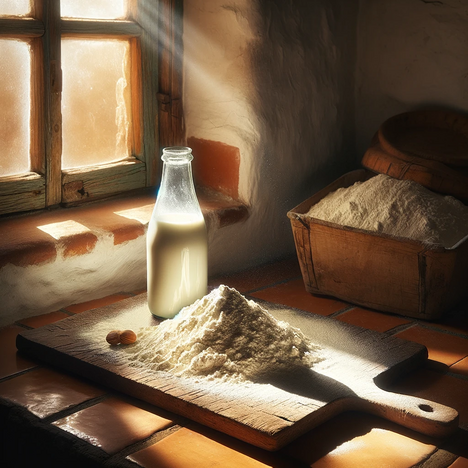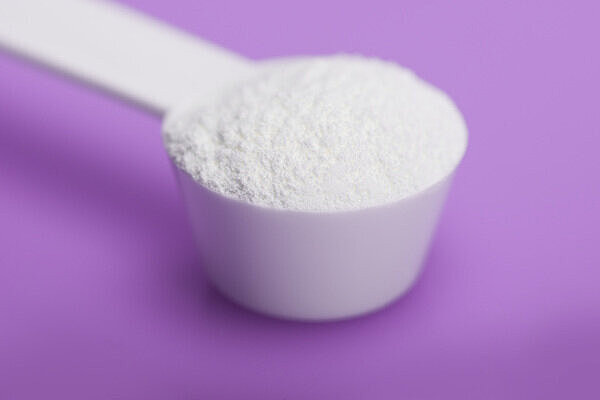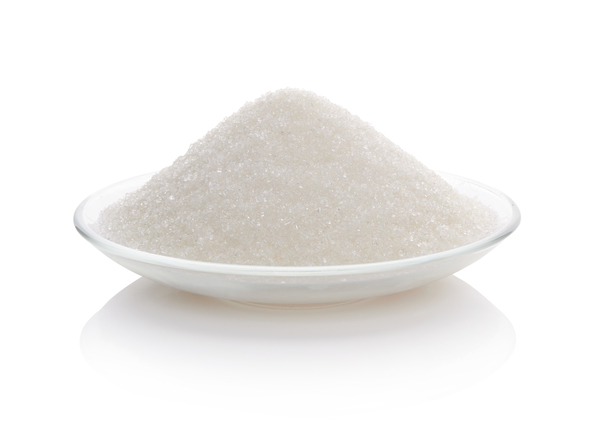Galactose

What is galactose?
Galactose is a monosaccharide or simple sugar that is closely related to glucose. It is a building block of many important biomolecules and occurs naturally in foods, especially in dairy products, where it forms lactose together with glucose. In the body, galactose is converted to glucose in the liver, which is then used as an energy source or stored for later.
Benefits of galactose for dogs
Natural source of energy
After ingestion, galactose is transported into the bloodstream and processed in the liver. The conversion to glucose provides a valuable source of energy for dogs, supporting them in everyday activities and growth.
Supporting brain health
Galactose is a component of important molecules in the brain and nervous system. The intake of galactose can therefore help maintain brain health and function, especially in older dogs.
Promoting intestinal health
In some cases, galactose can promote gut health by acting as a food source for beneficial gut bacteria. This can lead to a healthier microbiome and improved digestion.
Disadvantages and risks
Risk of lactose intolerance
Since galactose is a component of lactose, dogs with lactose intolerance may have difficulty digesting dairy products, which can lead to gastrointestinal discomfort. Symptoms of lactose intolerance include diarrhea, bloating and discomfort.
Potential risk of galactosemia
Although extremely rare, there is an inherited metabolic disorder called galactosemia in which the body cannot properly metabolize galactose. While this is mainly known in humans, dog owners should be aware of this risk, especially in breeds that may be prone to genetic metabolic disorders.
Excess and imbalance
As with any nutrient, an excess of galactose, especially if it is not properly metabolized, can lead to health problems. An imbalance in the diet can stress the liver and contribute to inadequate nutrition.
Galactose, as a simple sugar and natural part of the diet, offers both benefits and potential risks for dogs. It is a valuable source of energy that can contribute to brain and gut health. However, dog owners should be aware of the signs of lactose intolerance or other food intolerances and adjust the consumption of dairy products accordingly. A balanced diet that meets the individual needs and health status of each dog is the key to a long and healthy life.
If you notice any signs of hypersensitivity or poisoning in your dog, you should see your vet immediately. We are not a substitute for a vet, but we try to be as accurate as possible. Every dog reacts differently and we recommend you get a second opinion or consult your vet if in doubt.
Stay healthy and take good care of your four-legged friend!😊
Similar to Galactose
Glucose is a monosaccharide, i.e. a simple sugar. It consists of a ring of six carbon atoms to which hydrogen and oxygen atoms are attached. Glucose is the most common sugar in nature and is found...
Fructose is a carbohydrate that is an important source of energy for the body. It is absorbed in the small intestine and enters the bloodstream. There it is either consumed directly or stored in the...
Maltose is a source of carbohydrates that dogs can use for energy. However, maltose should only be fed in moderation, as too much sugar can lead to obesity, diabetes or tooth decay. Maltose can also...
Sucrose itself is not toxic to dogs, but it can lead to various health problems if fed in excessive quantities. These include: Tooth decay: sucrose encourages the growth of bacteria in the mouth,...



